Review: Studio Tenn's Season-Closing CABARET
The production runs through May 26th.
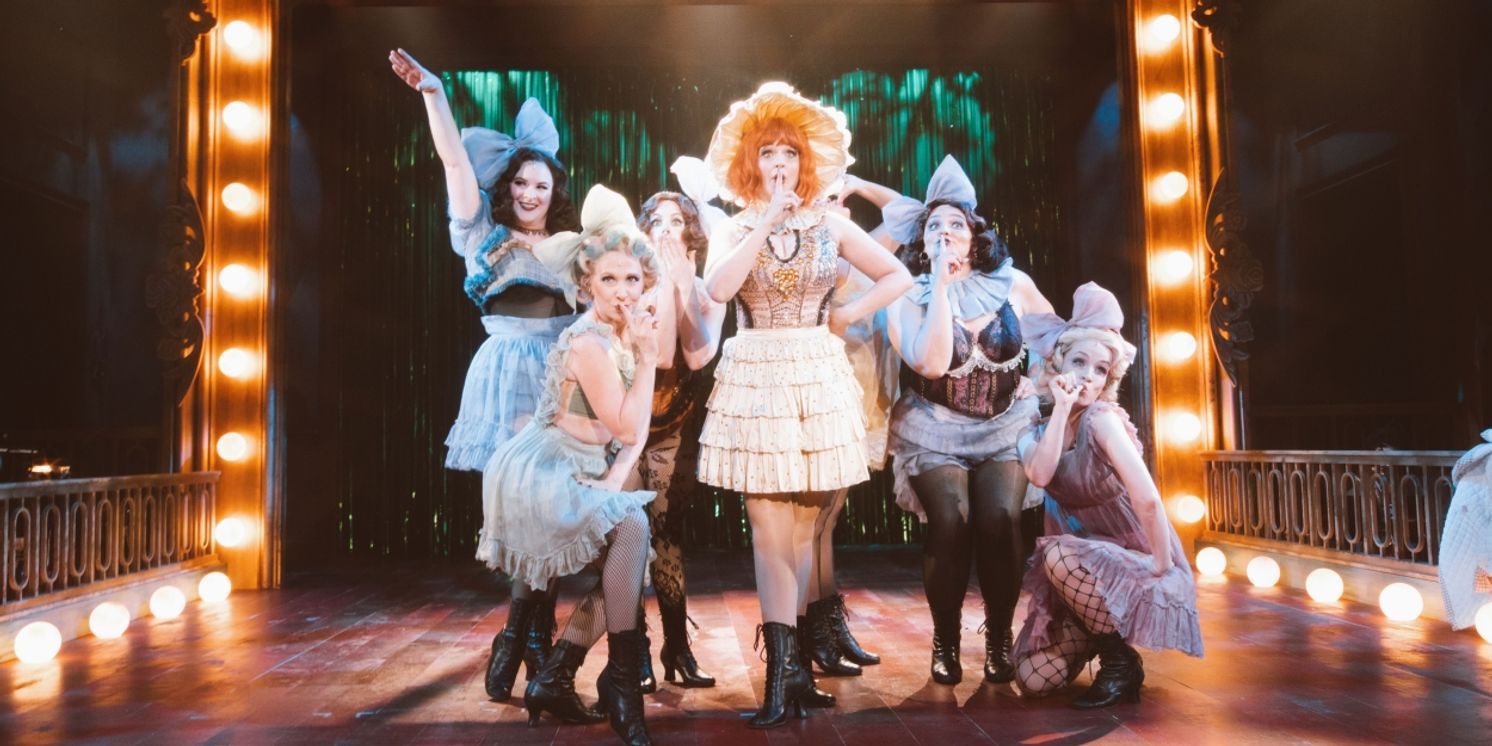
Paul Vasterling, the longtime CEO and artistic director of Nashville Ballet, makes his debut as a director of musical theater with his revival of Cabaret – which he also choreographs – in a much-heralded and eagerly anticipated production for Franklin-based Studio Tenn. The timely and sumptuous revival allows audiences an opportunity to consider the prescience of the classic Broadway musical by John Kander and Fred Ebb that debuted in 1966 and which has continued to fascinate and challenge artists of the theater the world over for almost 60 years.
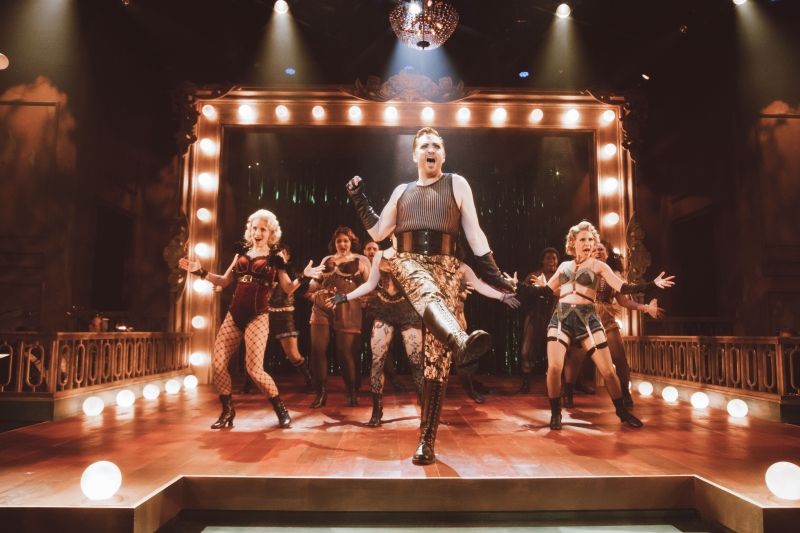
Studio Tenn’s Cabaret is exquisitely produced, its physical trappings and the festive atmosphere of an opening night transforming The Turner Theatre in The Factory at Franklin into Berlin’s notorious and fictional Kit-Kat Klub (which is inspired by any number of Weimar Era nightclubs and cabarets, though The El Dorado comes closest to the stageworthy nightclub) in the early 1930s, in the final frantic moments before the end of the Jazz Age, even as the menacing threat of the National Socialists starts to make its presence felt amid the vainglorious time of decadence and hedonism that followed the ending of the Great War.
In fact, Cabaret returns in a local production at the perfect time; we now live in a period that begs comparison to the excesses amid the deprivation of Europe between the two world wars, when social and class warfare seemed to be simmering beneath the surface of a society in which anything seemed possible, yet nothing seemed probable.
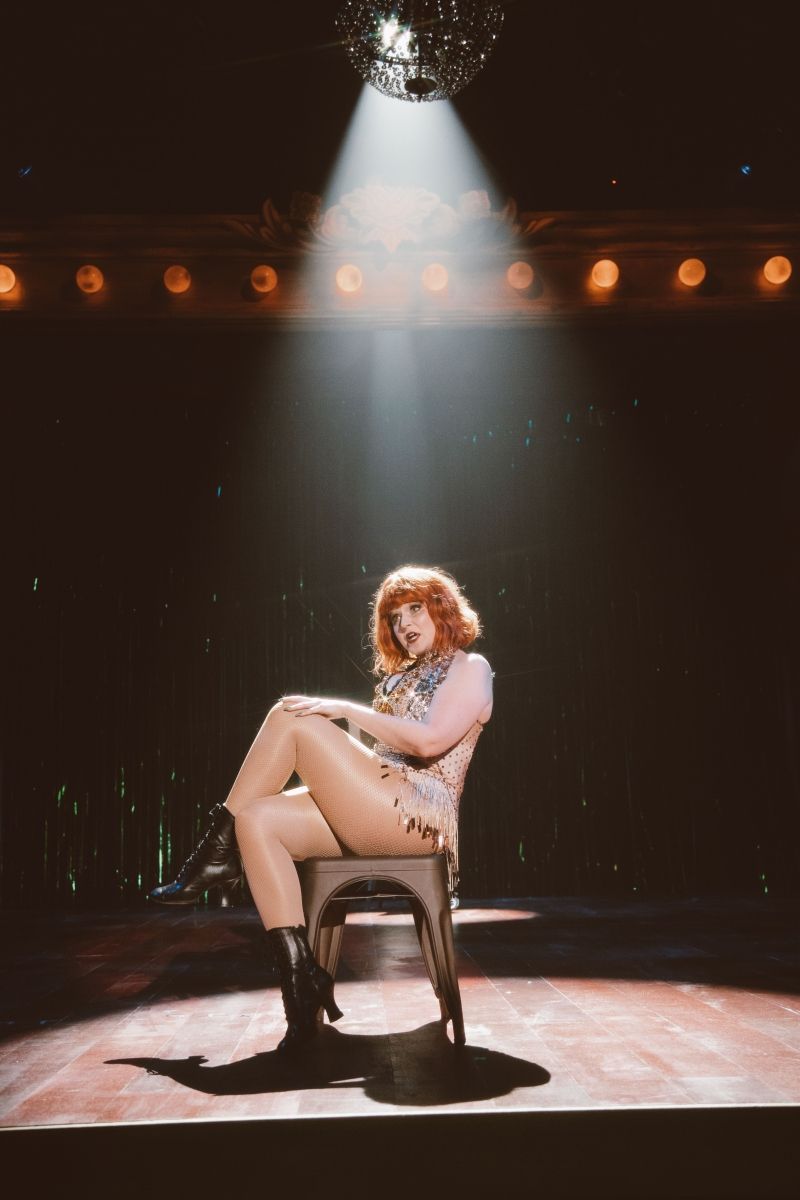
In the halcyon days of Weimar Berlin – one of the world’s most cosmopolitan and progressive cities, if not the prime example of worldly sophistication (though Paris or Prague also vied for that distinction) – people shell-shocked by the events of The Great War struggled to come to terms with Germany’s reduced situation internationally, both economically and politically, and sought to create a new world order defined by its embrace of various political beliefs, numerous intellectual pursuits and sundry sexual dalliances that seemed to free people from the chains of a restrictive and repressive past. Little did they know that the impact of the Great Depression, xenophobia and a reluctance to see things as they really were would ultimately lead to Nazis intent on taking over their world, descending it into madness.
The fictionalized world of Cabaret informs every thought, every idea and all the outrageous acts witnessed at The Kit-Kat Klub. The musical provides the theatrical equivalent of bright, shiny objects and glittering gewgaws to distract from the serious implications of what was really happening in the world during those tempestuous years. As a work of art, what Cabaret does so well is to offer some context to the events of life in Weimar Germany and the horror still to come, and to add the reflection, a consideration if you will, of human frailties writ large.
Cabaret’s story of a young American man in Berlin during the interwar years, and of the people he meets, comes to know and to love — the inimitable Sally Bowles, the somewhat sinister Emcee of the eponymous cabaret in which much of the action takes place, Fraulein Schneider, Herr Schultz, Fraulein Kost and Ernst Ludwig, the unprepossessing Nazi in their midst, and all the other denizens of the night — is disquieting and unsettling. In other words, just as it should be.
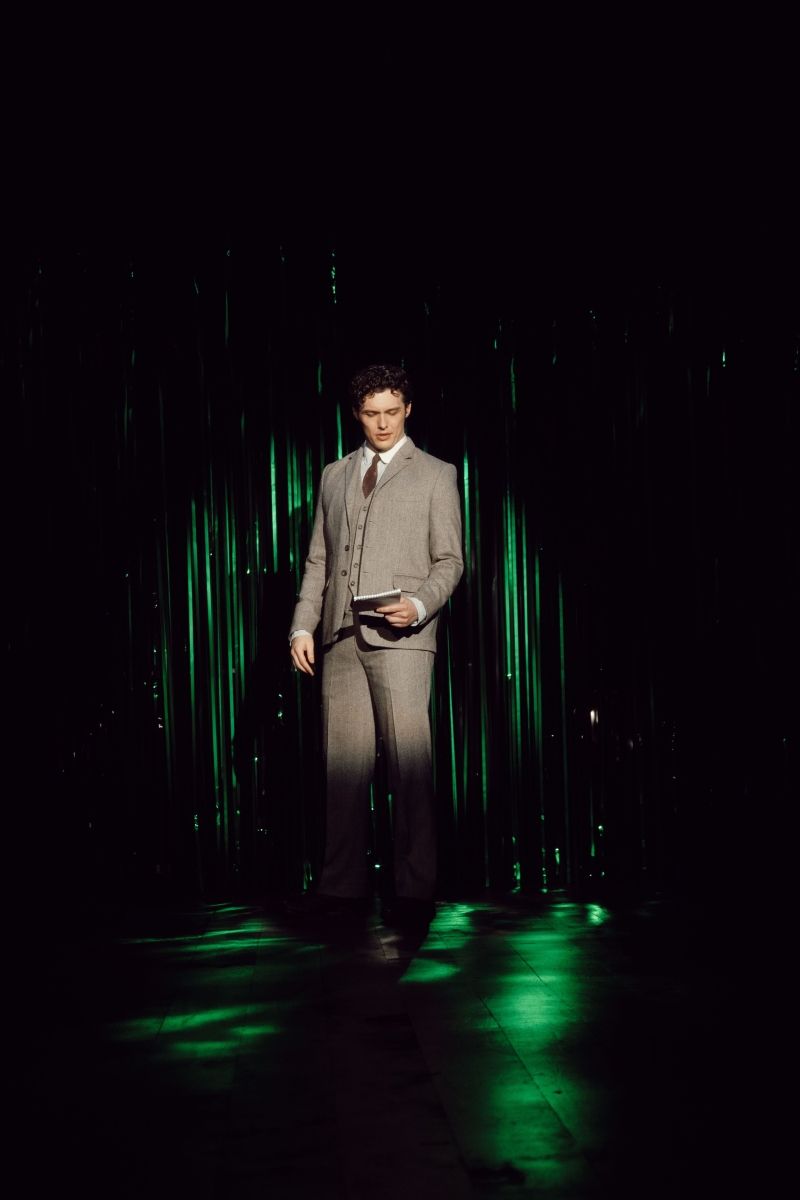
Everything that makes the musical so engrossing – the memorable score, the vivid characters who populate the story and the sordid milieu of a society dancing as fast as it can to stave off impending disaster – is brought sharply into view, albeit set to a familiar melody, which ensures each and every audience member walks away with a unique perspective of what is still to come in our time. Thus, Cabaret is so much more compelling than the light-hearted musical comedy so many consider it to be and is explanation enough for its continued prominence in the canon of musical theater and its many revivals on Broadway, West End, regional and local stages.
This Cabaret, which features direction and choreography by Vasterling (his direction seems assured and confident, although I question some blocking decisions that upstage some performers’ particularly poignant musical numbers: case in point, Sally’s “Maybe This Time” and Schneider’s “So What” and “What Would You Do” are upstaged by choices that sound good by design, but suffer in delivery) and musical direction by Stephen Kummer, is enthusiastically performed by their multi-talented cast, easily engaging its audiences, with the high-spirited antics of the Emcee (played by Brian Charles Rooney, who’s quickly made a name for himself on local stages) and Sally (portrayed by Nashville’s favorite musical theater star Megan Murphy Chambers) ensuring their rapt attention. The story of the Kit Kat Klub, and the people who gather there every evening to party like it’s 1929, is presented against the tumultuous backdrop of global upheaval and intrigue, spilling over into the private lives of the same individuals to which we are privy in the two-and-one-half hours of storytelling set to music.
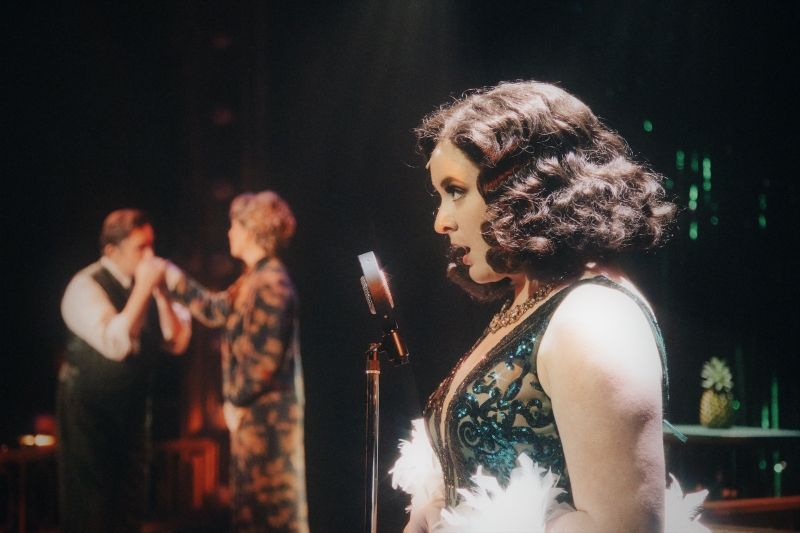
Joe Masteroff’s libretto, based upon John Van Druten’s 1951 play I Am A Camera (which, in turn, was inspired by Christopher Isherwood’s novella Goodbye to Berlin, published in 1939), creates a portrait of the era and of the nightclub, creating characters that demand to be noticed in all their guts and glory. The character of Sally Bowles, one of the most iconic females to be found in all of musical theater, represents the evolution of women’s roles during the 1920s, both roaring and otherwise, while her suitor Clifford Bradshaw (played by Caleb Shore) – a rather naïve young American expatriate seeking adventure in Berlin to help him achieve acclaim as a novelist – embodies everything the audience may find out about themselves over the course of the play.
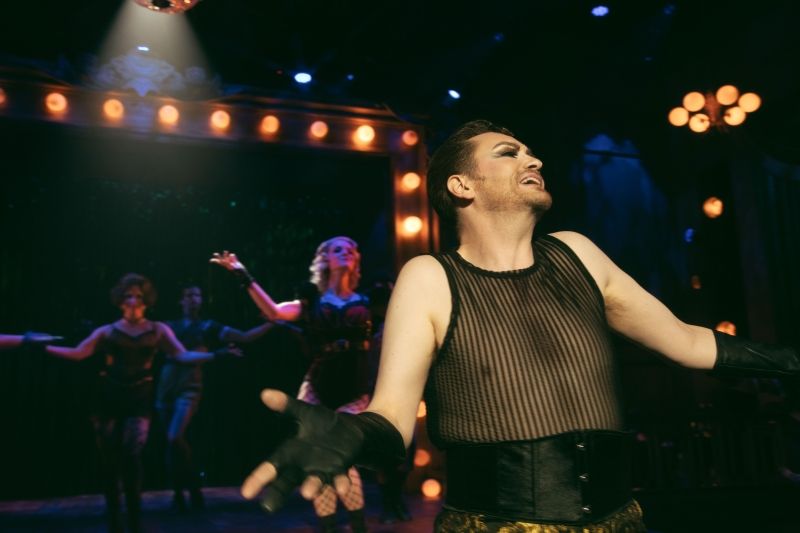
The Emcee of the Kit Kat Klub, whose given name we never learn and who appears almost cartoonlike (a caricature of the devil-may-care entertainer who lives only to cajole and comfort with outlandish persona), proves to be the audience’s conduit to the increasingly frenetic escapades that signal the total descent into madness and fascism among people from every strata of German society eager to try the next big thing in hopes of discovering an easy way out of their squalid lives.
Sally, Clifford and The Emcee – and their contrasting ways with dealing with what life offers them – are brought together, perhaps by happenstance, to give us a view of a world that is deceptive in its purported glamour and excess, only to be revealed at show’s end as something far more sinister and yet off-puttingly fascinating.
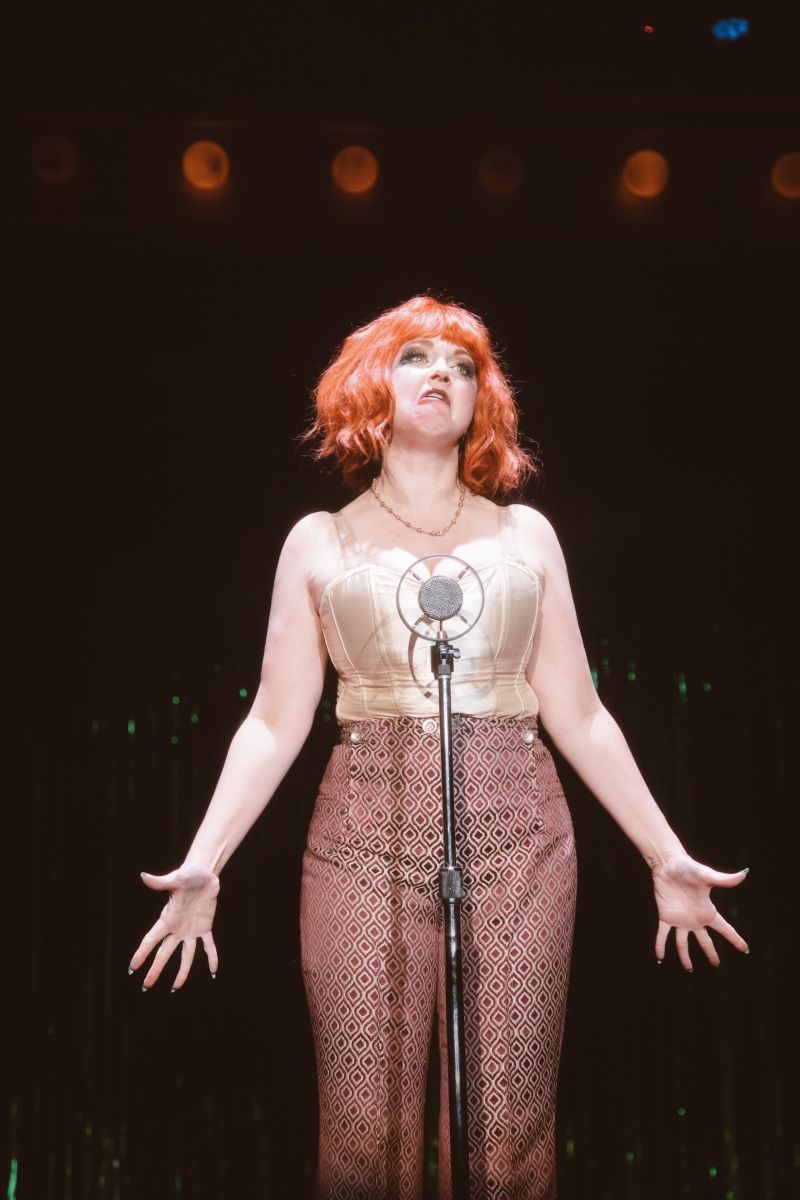
Murphy Chambers’ stunning portrayal of Sally Bowles, which manages to encapsulate her sense of wonder and carelessness with equal parts grace and grit, reveals a worldly interpretation of Sally while showing brief and fluttering glimpses of the characters’ lack of guile and refusal to see the world as it actually is. Her performance is electrifying throughout the play’s two acts, and each of her musical numbers could be called “showstopping” lest that description become redundant: “Don’t Tell Mama” and “Mein Herr” are delicious nightclub production numbers performed to grand effect by Sally and the Kit Kat Girls, while “Perfectly Maravelous” could be considered a bit of frothy musical comedy fun, if not for its underlying sense of desperation, and “Maybe This Time” is a terrific, theater-borne torch song that gives Sally a chance to authentically expose herself. “Cabaret” is Murphy Chambers at her supremely dramatic, if perhaps overwrought by half, best and is an ideal example of that which separates Cabaret from other titles in the American musical theater canon.
At first blush, Shore might appear as a stereotypical romantic lead, but he eschews the expected paint-by-numbers version of Cliff that we have seen far too many times, to instead create a more colorful portrait of the character. Charming and handsome, the confident Shore allows every audience member to see the world of Cabaret through his wildly innocent, American abroad persona.
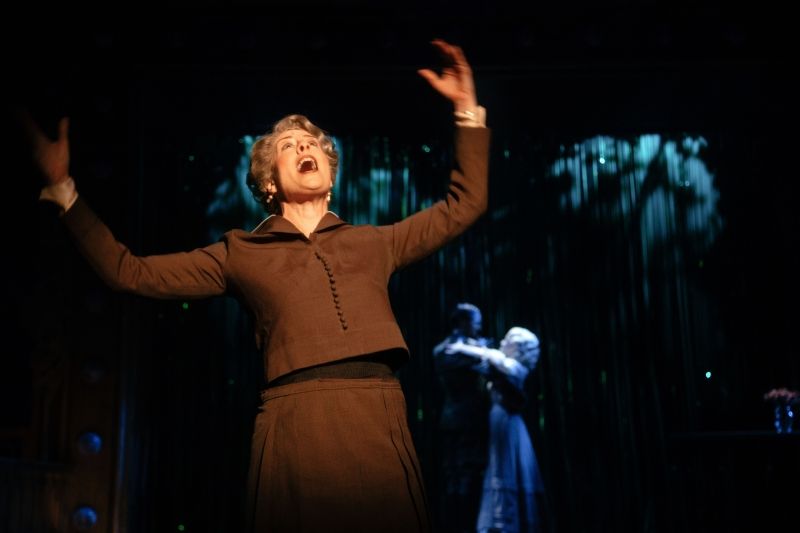
Yet clearly it’s Rooney as The Emcee who takes control of the show and, in turn, the audience from his first entrance, refusing to loosen his grip on their hearts (maybe even their very souls) until the musical’s shattering conclusion that leaves audiences rather breathless and uncertain of how to respond. Rooney is by turns raucous and hilarious, appealing and sinister, and his duality results in a staggering characterization. Rooney’s stage presence is compelling and his command of “Wilkommen” starts the show with aplomb and style, while his “I Don’t Care Much” proves expressive and emotional.
The leading trio is given ample support by the supporting cast who bring characters to life as Berlin dances precariously close to the cliffs of the Nazi era. Julie Cardia is heartrending as the world-weary and rather circumspect Fraulein Schneider (her performance of “What Would You Do?” is truly extraordinary), and Nashville theater legend Matthew Carlton is endearing as her earnest and appealing (and pineapple-bearing) Jewish suitor Herr Schultz, and his duets with Cardia on “It Couldn’t Please Me More” and “Married” are lovely.
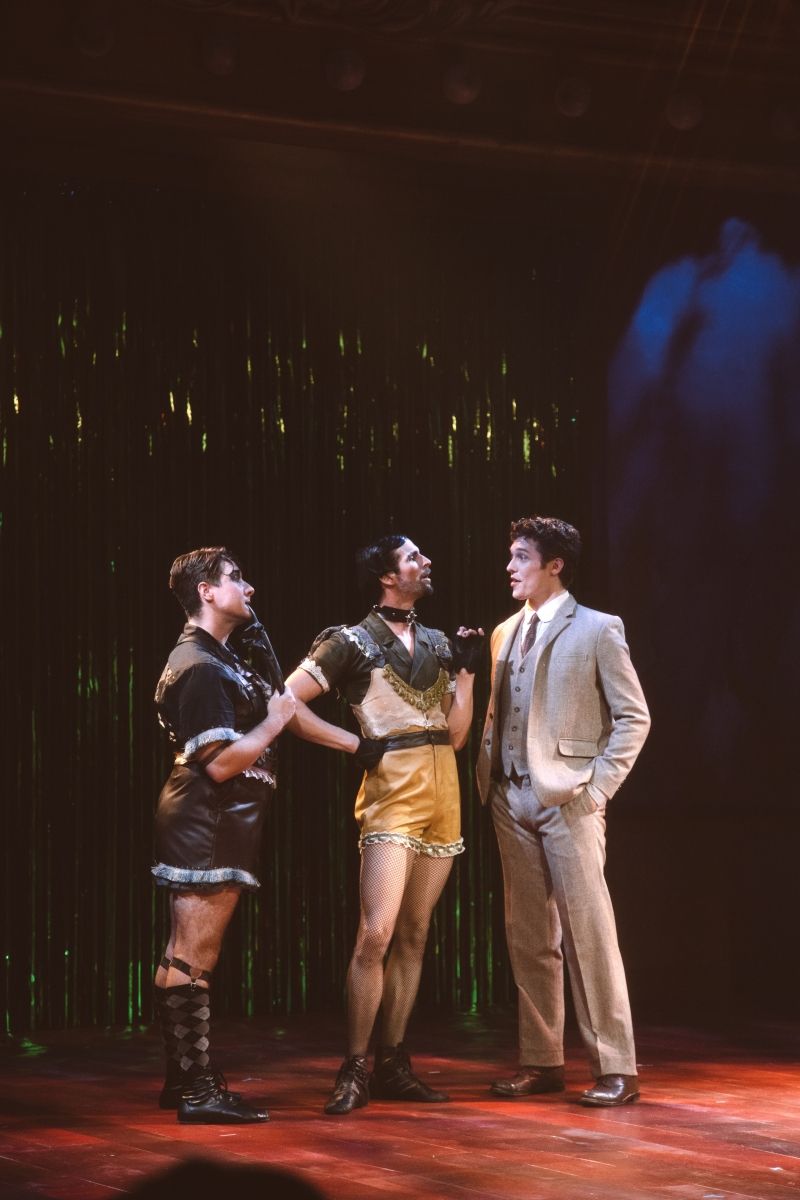
Jordan Tudor is quite impressive as the alluring Fraulein Kost and her performance of the romantic “Married” (sung in German) and the unsettling “Tomorrow Belongs to Me” are highlights of the show’s musical numbers. Studio Tenn co-founder and consummate theater professional Matt Logan is alternately delightful and charming, off-putting and ominous as the politically motivated Ernst Ludwig.
The other members of the ensemble – including Nashville Ballet veterans Mollie Sansone and Owen Thorne, along with Victoria Griffin, Cody Cooley, Gerold Oliver, Calvin Malone, Laura Oldham, Meggan Utech and Allison Little – provide strong support throughout the show, performing Vasterling’s inventive choreography with expressive zeal and providing their own colorful storytelling.
Musical director Kummer’s musicians are impressive in their dexterity, providing rich interpretations of the memorable John Kander score.
Andrew Cohen’s set design for the Kit-Kat Klub is gorgeous and glittering, creating a palace of entertainment that, all the same, seems incongruous as the setting for the seedy and tawdry Weimar nightspot. Stephen Moss’ lighting design adds to that overall glamourous impact to create a noteworthy artistic aesthetic, but that seems too grand for the Kit-Kat Klub. Likewise, Alexa Behm’s costume design is equally beautiful and impressive (Sally wears stunning, exquisitely crafted ensembles), but her clothes seem out of place in the environs of a Berlin nightclub circa 1931, and in that same vein, I cannot help but ask why the guests at the engagement party of Fraulein Schneider and Herr Schultz are all dressed in hats and coats? Kudos to designer Hannah Lunt for providing her cast with exceptional wigs that help to define the era. And, finally, congratulations to Mark Zuckerman for his exceptional sound design.
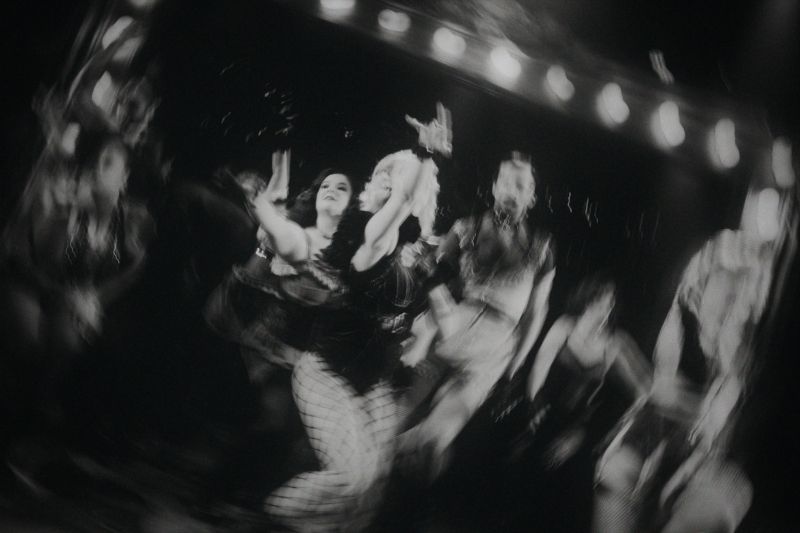
Cabaret is a musical theater treasure – one that we love as much as anything ever written by Rodgers and Hammerstein, Sondheim, Porter, Styne, the Gershwins, Lerner and Loewe, Pasek and Paul, or any of the other members of the theatrical pantheon – in fact, what this production proved most effectively is just how beloved the show and its score are. No matter if you’ve seen countless iterations of Cabaret – or particularly if you’ve seen it but once – it is one of those musical theater masterpieces that you really should experience time and again in order to affirm your musical theater bona fides.
Cabaret. Book by Joe Masteroff. Music by John Kander. Lyrics by Fred Ebb. Based on the play by John Van Druten and the stories by Christopher Isherwood. Directed and choreographed by Paul Vasterling. Musical direction by Stephen Kummer. Stage managed by Cecilia Lighthall. Presented by Studio Tenn at The Turner Theatre in The Factory at Franklin. For tickets and for more information, go to www.studiotenn.com. Running time: 2 hours, 30 minutes (with one intermission). Through May 26.
Photos by Sammy Hearn
Reader Reviews

Videos

